Eager for change, these Ukrainian voters back a comedian for president. Seriously
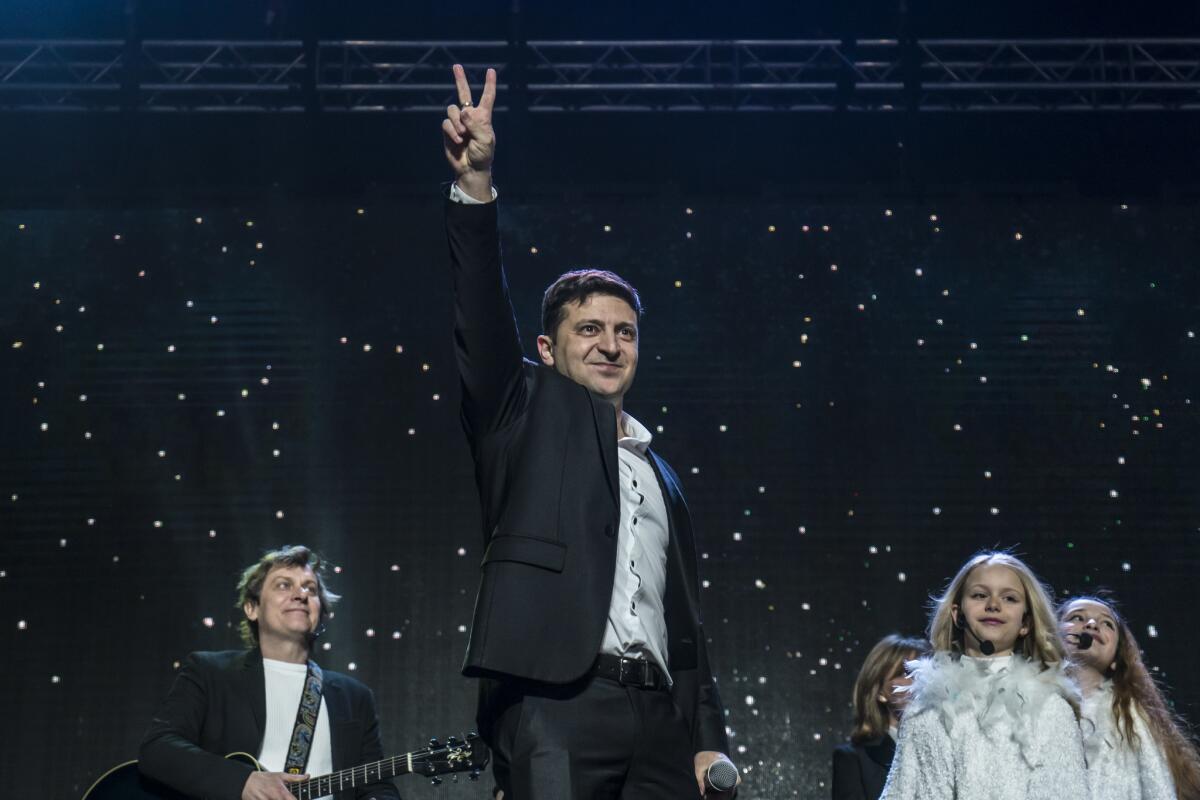
- Share via
Reporting from Dnipro, Ukraine — In a hit TV sitcom, he plays a schoolteacher who gets elected president almost by accident. But in real life, Volodymyr Zelensky’s run for the presidency is no accident, though his campaign is plenty unconventional.
Instead of traditional campaigning, Zelensky, an entertainer by trade, has been crisscrossing Ukraine with his variety show, “Kvartal 95.” Zelensky’s act doesn’t directly appeal for votes, but it mocks today’s politicians and hints at a candidate intent on doing things differently than the league of politicians who are the butt of most of his jokes.
Zelensky’s vague but anti-establishment candidacy has appealed to Ukrainians frustrated with the status quo and eager for change. In the most recent Kiev International Institute of Sociology poll, he ranks several percentage points ahead of two political veterans, incumbent President Petro Poroshenko and Yulia Tymoshenko, the firebrand former prime minister now making her third presidential bid.
With Zelensky polling at roughly 18%, and a majority of the vote needed for victory in Sunday’s balloting, a runoff appears all but inevitable. Pollsters predict the second round would probably pit the comedian against one of the two longtime political leaders.
“Why not give him a chance?” asked Julie Zaichenko, 26, a teacher in the southeastern city of Dnipro, formerly known as Dnipropetrovsk. She and two friends stood in line for almost two hours to get a place close to the stage for a free performance of “Kvartal 95.” “We are ready for change, because we can’t go on the way we have been. Our country cannot survive the way it is.”
Five years after sustained street protests ousted a Kremlin-favored president and oriented the country westward, Ukraine is still struggling to realize all the goals of the 2014 revolution, also known as the Maidan Revolution. Ongoing fighting with Russia-backed separatists in the east has resulted in 13,000 deaths and handicapped the economy by cutting off its industrial eastern powerhouse. Also in 2014, Moscow annexed the Crimean peninsula, long a part of Ukraine. In Kiev, the nation’s capital, reforms have been slow going; fighting corruption has been marred by more corruption and lack of political will.
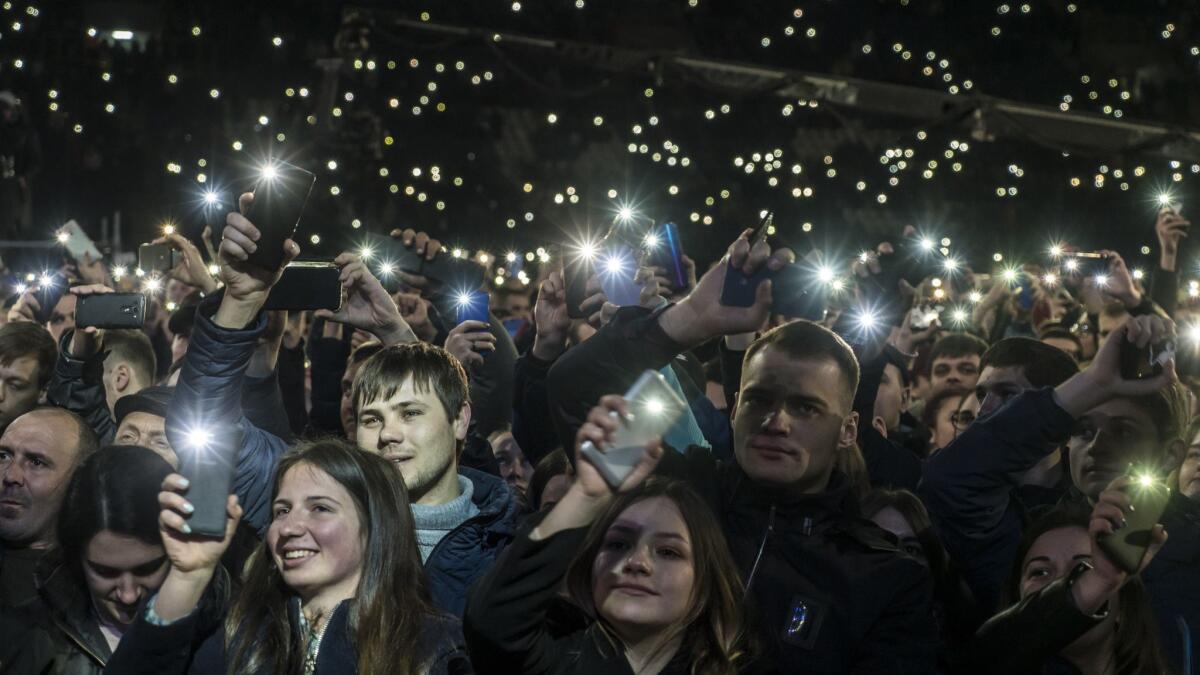
But Zelensky’s surprising surge in the polls may be a positive albeit unusual sign that the country is emerging out of political crisis, some analysts say. With 39 candidates on the ballot, it is the most competitive election in Ukraine’s modern history, said Leo Litra, a senior researcher at the New Europe Center, a think tank in Kiev.
“If Ukraine manages to have a peaceful transition of power through free and fair elections in times of war, then this is a very important element that will show that Ukraine is advancing quite fast in its democracy,” Litra said.
For the first time in Ukraine’s 28 years of independence, voters are not choosing between a pro-Western and a pro-Russian candidate, a direct result of Moscow’s annexation of Crimea and backing of the separatist warfare in eastern Ukraine, Litra said. It also is an election in which voters can democratically choose among a wide range of candidates, all but one of which lean heavily toward integrating with Europe.
“This campaign is proof that Ukraine doesn’t have a black-and-white election, like in Russia, where people are choosing from one candidate and that’s it,” said Alex Ryabchyn, a deputy in the Ukrainian parliament, or Rada. “I’m proud of my country that we have a democracy in which we don’t know who the winner is before the election.”
Four years after Russia annexed Crimea, the peninsula remains in limbo »
Much is at stake for the nation of 43 million. The next president will have to take on Russian President Vladimir Putin in attempting to resolve the conflict in the east, where the Kremlin has backed separatist militias and supported the self-declared Donetsk and Luhansk people’s republics. The so-called Minsk peace talks have collapsed, and daily fighting continues.
Poroshenko, who won with 55% of the vote after the 2014 revolution, has since struggled to gain the country’s confidence. Last month, his ratings took another hit when he became ensnarled in a corruption scandal involving defense procurement.
Poroshenko, 53, has tried to capitalize on his presidency’s establishment of an independent Ukrainian Orthodox Church separate from the Moscow-based Russian Orthodox Church. Now sanctioned by the Orthodox patriarch, Ukraine’s own church was seen as an important step toward a complete exit from Moscow’s orbit.
Ukraine has only once reelected a sitting president in its post-Soviet history. Poroshenko’s best chance at becoming the second incumbent to win the vote lies in his ability to convince voters that even if they don’t like him personally, at least they know they are getting a strong pro-Western voice by reelecting him.
If the polls are correct, Poroshenko is running neck and neck with political rival Tymoshenko for the second spot in a runoff.
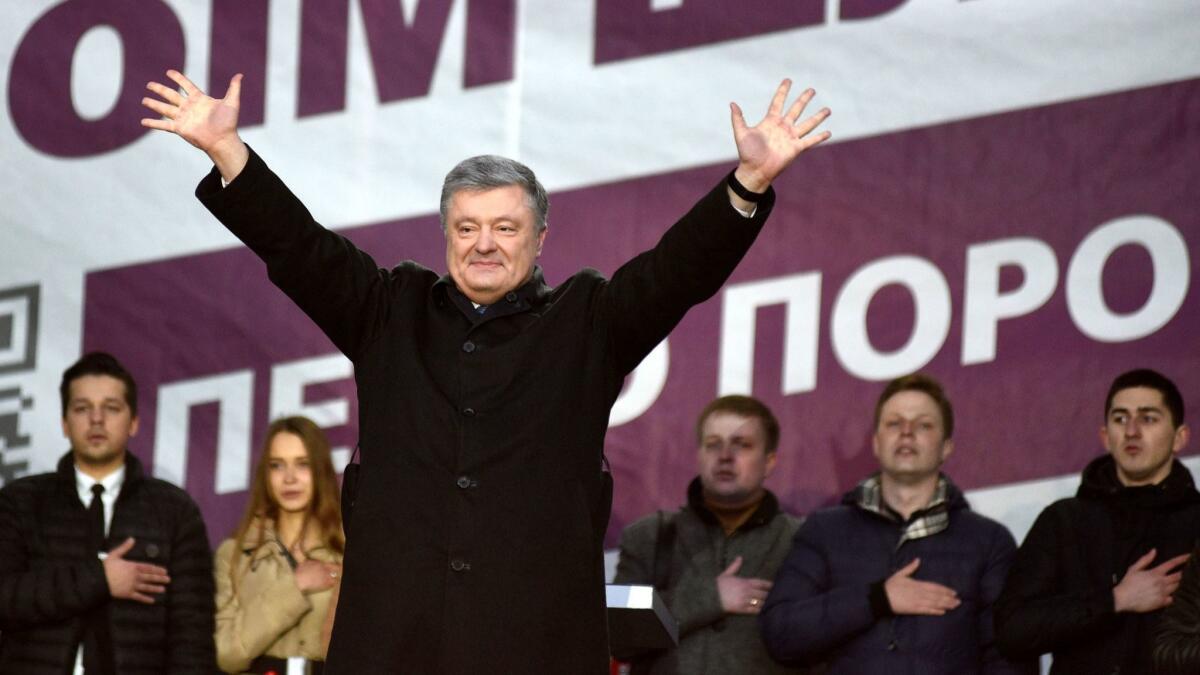
Tymoshenko, 58, has twice served as prime minister and has also served time behind bars on charges of abuse of power, accusations she says were politically motivated by her rivals.
During the 2004 Orange Revolution, she stepped on stage in Kiev with her long, blond hair wrapped in a halo of thick braids. The traditional Ukrainian peasant woman’s hairstyle stuck, and she became instantly recognizable in the West as Ukraine’s firebrand who could whip up a crowd with her populist rhetoric.
But her ability to maneuver within Ukraine’s lucrative energy sector led many Ukrainians, who dubbed her the Gas Princess, to distrust her. Putin has said she is a Ukrainian candidate the Kremlin knows and can deal with, drawing more distrust from Ukrainians weary of Russian aggression against their country, a former Soviet republic.
Tymoshenko has based her campaign on populist promises of lowering gas prices and increasing pensions and salaries. At a recent campaign rally on the outskirts of Kiev, she said she would bring Ukraine to “Poland’s economic level within the next five years.”
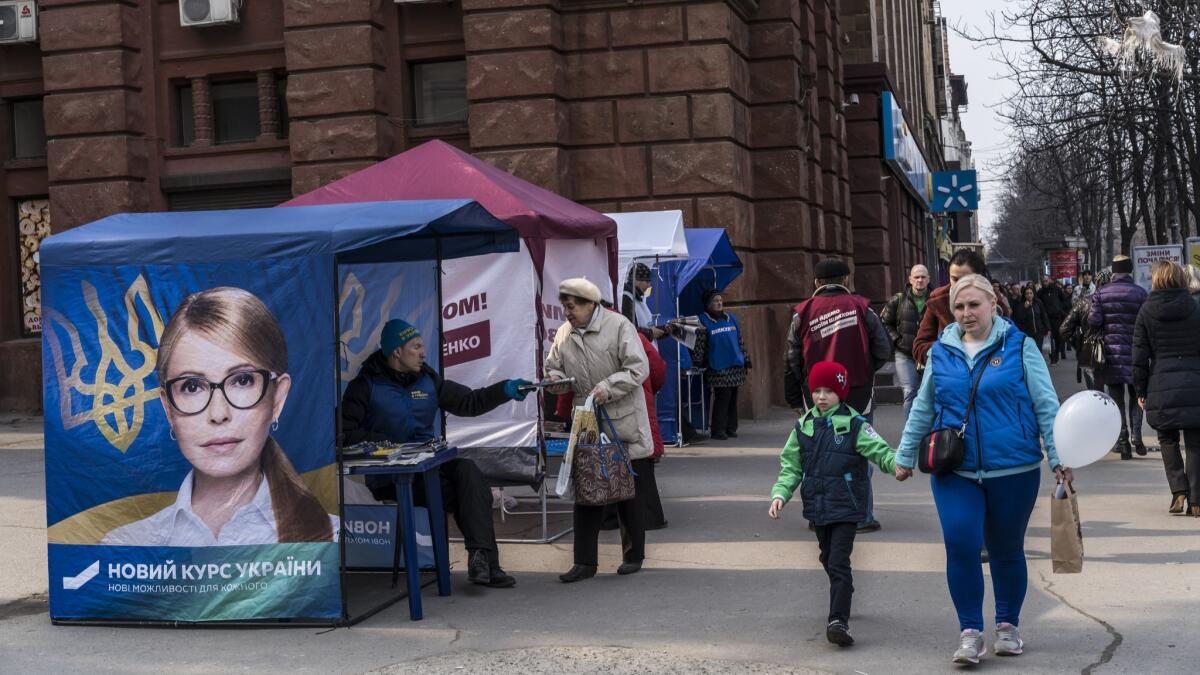
When Zelensky announced his candidacy on New Year’s Eve, his weekly television show on a non-state channel, “Servant of the People,” was already a nationwide hit. Zelensky plays Vasyl Petrovych Holoborodko, a high school history teacher who wins the presidency after a video of him ranting to a colleague about Ukraine’s inept and corrupt politicians goes viral. The show focuses on the trials and tribulations of the unlikely people’s president going up against the political establishment.
In that sense, Zelensky’s rise in today’s campaign mimics his show’s plot. Zelensky is accused of having close ties to oligarch Ihor Kolomoisky, one of the country’s richest men and a rival of Poroshenko. Kolomoisky owns the television station 1+1, which broadcasts Zelensky’s sitcom, but denies he is financing the comedian’s campaign.
But many Ukrainians fear a vote for Zelensky could be a disaster for the country if the comedian, with no political experience and no clearly articulated platform, were to win.
Zelensky has given few interviews to the press and has not participated in debates with other leading candidates. Critics say he lacks a clear plan for ending the war in eastern Ukraine, a major concern for the country.
“Zelensky says that we should just stop shooting,” said Oleksander Broslavets, 37, who was drafted in 2015 to fight in the Ukrainian military. “As a person who has been on the front line, I understand that if we stop shooting, the other side will not.”
Broslavets tends bar at Veterano’s Pizza, a restaurant owned and operated by veterans of Ukraine’s fighting against the pro-Russia militias in the east. The restaurant has several franchises across the country, employing veterans as a way of assisting their reintegration after returning from the front.
“I’m not saying that Poroshenko is 100% my president or that I like him,” he said. “He has made a lot of mistakes and had five years for making sufficient reforms within the country. But Poroshenko is fighting to bring back our territories in Donetsk, Crimea, Luhansk, and that’s the most important thing right now.”
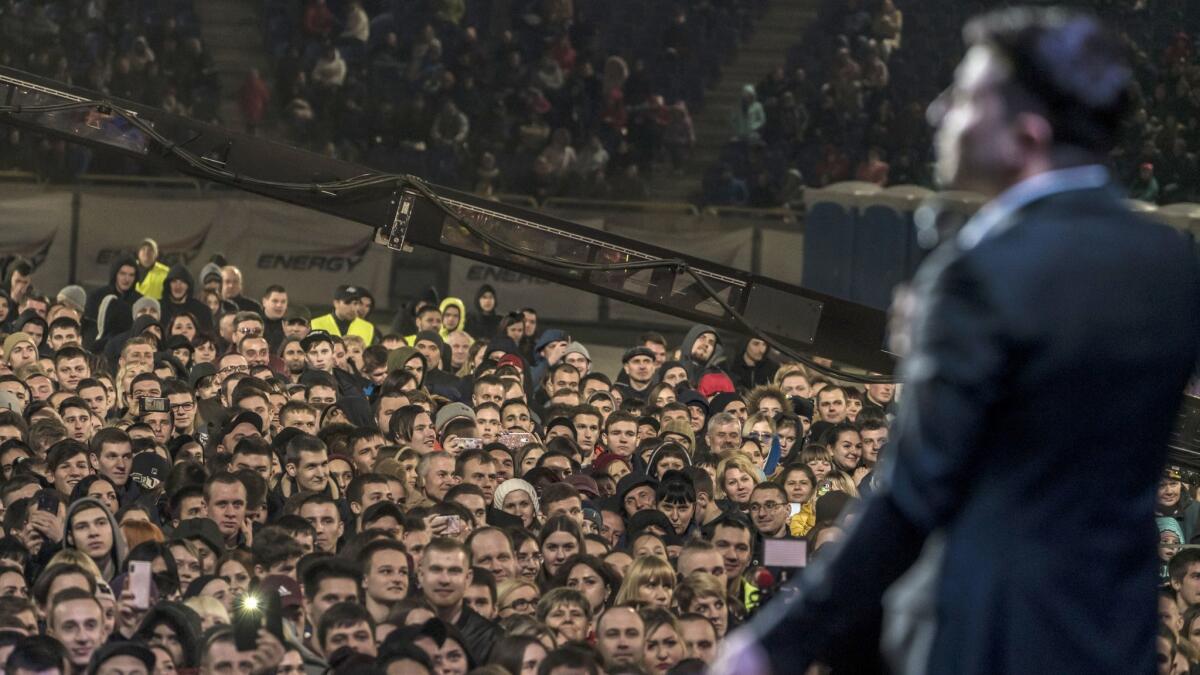
Zelensky and his troupe were scheduled to perform up until two days before Sunday’s vote. At the first of two variety shows in Dnipro this week, a crowd of about 8,000 people laughed and sang along at the two-hour free performance.
“You guys have been so warm. This has been a great evening,” he said in his trademark raspy voice before closing the show. “I think if Petro Oleksiyovych [Poroshenko] were here, he would also vote for me.”
Zelensky, who grew up in the industrial central city of Krivoy Rog, speaks mostly Russian, splintered with a local dialect known as surzhyk, a mixture Ukrainian and Russian languages common throughout the bilingual country. He told the crowd that no matter what, they should go out and vote on March 31.
“ZELENSKY!” echoed through the stadium and spilled onto the chilly night streets of Dnipro.
“Guys, now I can’t let you down,” he said before launching into the show’s final act, a song about the need to shake up the country’s corrupt political system and change it for the future generation of Ukrainians.
Ayres is a special correspondent.
More to Read
Sign up for Essential California
The most important California stories and recommendations in your inbox every morning.
You may occasionally receive promotional content from the Los Angeles Times.











